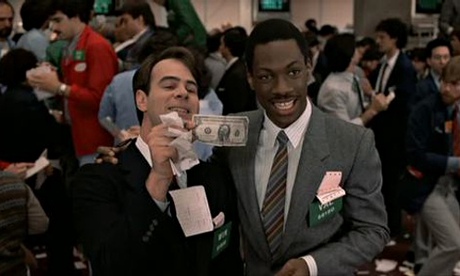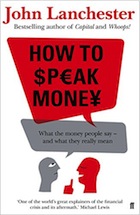Do you only sorta-kinda know about economics? Are you unsure about the difference between budget deficit and the national debt? You should read this entertaining lexicon

Professional hustlers … Dan Akroyd and Eddie Murphy in Trading Places.
On the night before Christmas Eve, our family has a ritual. We go to the panto and then for a curry. Finally, we sit down to watch Trading Places, arguably the greatest Christmas film ever and unarguably the best film ever about the way financial markets work. Anybody who wants to understand what is meant by taking a long position or a margin call could do a lot worse than spend a couple of hours watching what happens when a couple of unscrupulous commodities traders decide, for a bet, to replace their Harvard-educated chief executive (Dan Aykroyd) with a hustler from the ghetto (Eddie Murphy).
How to Speak Money
by John Lanchester
John Lanchester is a Trading Places fan. That's evident from his latest attempt to demystify the workings of the global economy and the financial markets. How to Speak Money is really a Bluffer's Guide, albeit a top-of-the-range job. Read this and you will know your Laffer curve from your Glass-Steagall Act. You will also discover that there is an Eddie Murphy rule, based on the proposed law changes in the US to prevent people using wrongly acquired information to rig the commodities market. It references the scam Murphy and Aykroyd pull in the denouement to Trading Places.
Lanchester's lexicon is not aimed at professional economists and investment bankers. To be sure, they could happily while away a couple of hours looking for omissions and errors, but this is really a book for interested amateurs. These fall into two camps: the people who haven't really got a clue why the global economy teetered on the brink of disaster in the winter of 2008 and want to know why; and people who think they understand why the Royal Bank of Scotland came within a couple of hours of switching off its cash machines but whose knowledge is, in truth, a bit fuzzy.
As Lanchester puts it, he is writing a book for people who "sorta-kinda" know what's happening. They watch the news and think they know what is meant by fiscal policy and sub-prime mortgages but couldn't say for sure. "I know all about this type of semi-knowledge because I was completely that person," he says in the introduction: "the one who sorta-kinda knew what was being talked about, but not in enough detail to really engage with the argument in a fully informed, adult manner".
That may have been the case once. This, though, is Lanchester's third go at lifting the bonnet of the modern globalised, financialised economy. The first was Whoops!, one of the best books about what led to the end of the long boom that followed the collapse of communism. The second was Capital, a fictional account of life in London at the moment the sky fell in.
How to Speak Money is a more difficult book to pull off, because in essence it's a long and specialised list. But it works – for three reasons. First, Lanchester is a fine writer. His prose is clear and precise, and that helps a lot when the subject matter is challenging. Second, he peps up the list with humour. As someone who has always thought the definition of "flexible labour market" is "you're fired", I was tickled by the following three entries:
These two bookends demonstrate where Lanchester is coming from. He thinks, rightly, that something went badly wrong with economics in the final quarter of the 20th century, an era in which, under the guise of acting out of pure rationality, the financial markets turned into a giant doomsday machine. When the crisis broke in the summer of 2007, few people really understood what the traders had been doing with their fancy models and their exotic financial instruments. In some cases, that included those running the big banks, who didn't ask questions so long as the profits were rolling in.
Since 2007, more questions have been asked, but curbs on finance have been far more modest than those placed on the unions after they were deemed to have screwed up the economy in the 1970s. Little has fundamentally changed, apart from the fact that all of us, the bankers apart, are poorer.
This matters. The important question thrown up by the crisis, Lanchester says, is "whether a society should arrange itself primarily for the convenience of its richest citizens and its richest, most powerful economic sector, irrespective of the consequences of that for everyone else". He notes that a robber baron's castle can be full of sumptuous art, lavish food and drink and wonderful music but can only shine brightly because it destroys the landscape in which it sits. "The City of London," he writes, "is a robber baron's castle."
Lanchester thinks the robber barons get away with it because of the big gap that exists between the people who understand money and the rest. And the reason there is a big gap, he says, is that the money folk speak their own esoteric language that sets them apart. That explains why economics feels so alienating to outsiders.
In truth, there is more to the power of finance than its use of obfuscatory language. The global banks are now so big and interlocked that breaking them would be hard to do even if politicians had the will. Which they don't, because the banks are the most powerful lobbying force on earth, and have burrowed their way deep into the political structure of every western nation. But change has to start somewhere.
Lanchester's book has its omissions. There is no entry for David Ricardo, the 19th-century economist responsible for the theory of why countries trade with each other. Nor is there a mention of Hyman Minsky, whose explanation of why financial crises occur has become fashionable since the great recession of 2008-09.
It is also annoying that the book does not have an index. Presumably, the publishers thought the list format made it unnecessary, but they were wrong. Searching for the reference to Isaac Newton – who despite being the cleverest man in the world lost a packet in the South Sea Bubble – I had to skim through every listing before finding it (under "greater fool theory").
But these are minor quibbles. For all the "sorta-kinda" people, this book is invaluable. And if you're still not sure if you are a sorta-kinda person, here's a simple experiment for you. Can you explain the difference between the budget deficit and the national debt? What is the output gap? What happens to bond yields when the price goes up? If you can answer all three questions, congratulations: you already know how to speak money.
How to Speak Money
Lanchester's lexicon is not aimed at professional economists and investment bankers. To be sure, they could happily while away a couple of hours looking for omissions and errors, but this is really a book for interested amateurs. These fall into two camps: the people who haven't really got a clue why the global economy teetered on the brink of disaster in the winter of 2008 and want to know why; and people who think they understand why the Royal Bank of Scotland came within a couple of hours of switching off its cash machines but whose knowledge is, in truth, a bit fuzzy.
As Lanchester puts it, he is writing a book for people who "sorta-kinda" know what's happening. They watch the news and think they know what is meant by fiscal policy and sub-prime mortgages but couldn't say for sure. "I know all about this type of semi-knowledge because I was completely that person," he says in the introduction: "the one who sorta-kinda knew what was being talked about, but not in enough detail to really engage with the argument in a fully informed, adult manner".
How to Speak Money is a more difficult book to pull off, because in essence it's a long and specialised list. But it works – for three reasons. First, Lanchester is a fine writer. His prose is clear and precise, and that helps a lot when the subject matter is challenging. Second, he peps up the list with humour. As someone who has always thought the definition of "flexible labour market" is "you're fired", I was tickled by the following three entries:
Reducing payroll Sacking people.Third, he gets the balance right: the book is neither too technical nor too patronising. He provides a long introduction of more than 60 pages explaining why the language of money matters, and a shorter afterword in which he explores how we can put all this newfound knowledge to good use.
Redundancy Sacking people.
Reform This is something of a weasel word. In its modern economic usage it never, ever, not once, means 'hiring more people and giving your current workforce more generous pay and conditions'. Instead it usually means sacking people and making the ones who are in work do more for less.
These two bookends demonstrate where Lanchester is coming from. He thinks, rightly, that something went badly wrong with economics in the final quarter of the 20th century, an era in which, under the guise of acting out of pure rationality, the financial markets turned into a giant doomsday machine. When the crisis broke in the summer of 2007, few people really understood what the traders had been doing with their fancy models and their exotic financial instruments. In some cases, that included those running the big banks, who didn't ask questions so long as the profits were rolling in.
Since 2007, more questions have been asked, but curbs on finance have been far more modest than those placed on the unions after they were deemed to have screwed up the economy in the 1970s. Little has fundamentally changed, apart from the fact that all of us, the bankers apart, are poorer.
This matters. The important question thrown up by the crisis, Lanchester says, is "whether a society should arrange itself primarily for the convenience of its richest citizens and its richest, most powerful economic sector, irrespective of the consequences of that for everyone else". He notes that a robber baron's castle can be full of sumptuous art, lavish food and drink and wonderful music but can only shine brightly because it destroys the landscape in which it sits. "The City of London," he writes, "is a robber baron's castle."
Lanchester thinks the robber barons get away with it because of the big gap that exists between the people who understand money and the rest. And the reason there is a big gap, he says, is that the money folk speak their own esoteric language that sets them apart. That explains why economics feels so alienating to outsiders.
In truth, there is more to the power of finance than its use of obfuscatory language. The global banks are now so big and interlocked that breaking them would be hard to do even if politicians had the will. Which they don't, because the banks are the most powerful lobbying force on earth, and have burrowed their way deep into the political structure of every western nation. But change has to start somewhere.
Lanchester's book has its omissions. There is no entry for David Ricardo, the 19th-century economist responsible for the theory of why countries trade with each other. Nor is there a mention of Hyman Minsky, whose explanation of why financial crises occur has become fashionable since the great recession of 2008-09.
It is also annoying that the book does not have an index. Presumably, the publishers thought the list format made it unnecessary, but they were wrong. Searching for the reference to Isaac Newton – who despite being the cleverest man in the world lost a packet in the South Sea Bubble – I had to skim through every listing before finding it (under "greater fool theory").
But these are minor quibbles. For all the "sorta-kinda" people, this book is invaluable. And if you're still not sure if you are a sorta-kinda person, here's a simple experiment for you. Can you explain the difference between the budget deficit and the national debt? What is the output gap? What happens to bond yields when the price goes up? If you can answer all three questions, congratulations: you already know how to speak money.


No comments:
Post a Comment